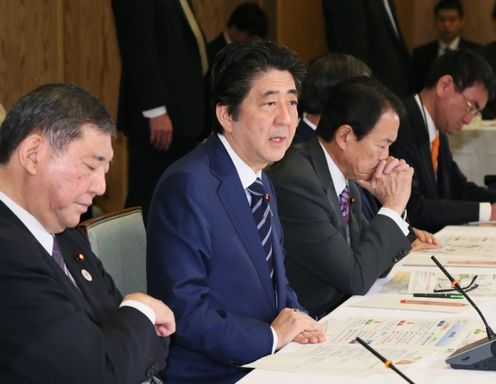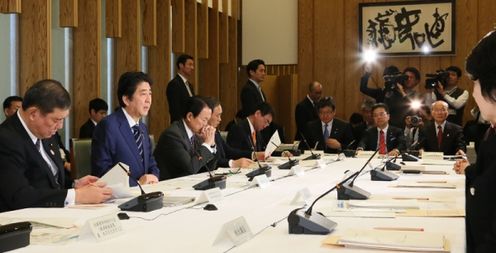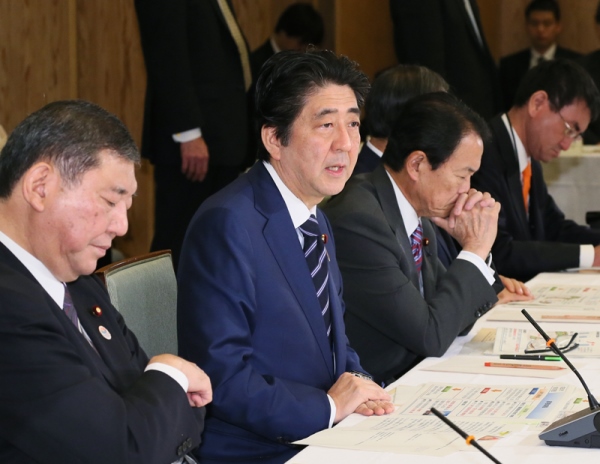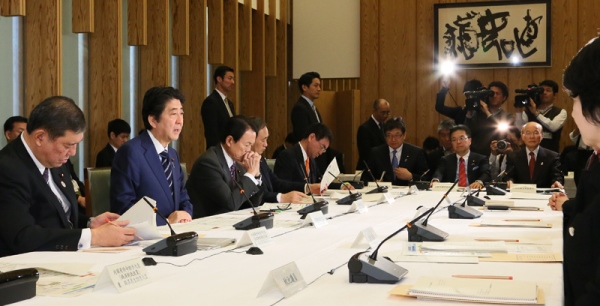Home > News > The Prime Minister in Action > November 2015 > Council on National Strategic Special Zones
The Prime Minister in Action
Council on National Strategic Special Zones
November 27, 2015

Photograph of the Prime Minister making a statement (1)

Photograph of the Prime Minister making a statement (2)
[Provisional Translation]
Prime Minister Shinzo Abe held the 17th meeting of the Council on National Strategic Special Zones at the Prime Minister's Office.
During the meeting, debate took place on certifying the special zone plan and the third designations for National Strategic Special Zones.
Based on the discussion, the Prime Minister said in his address,
“Today, we have utilized our list of new regulatory reforms in the National Strategic Special Zones and certified 16 projects. This brings the number of certified projects up to 123.
For the first time, we will realize the private management of public schools. In Aichi Prefecture, management of advanced courses at public high schools will be entrusted to the private sector. A wide variety of people in the private sector will become teachers, and they will work to produce a long line of future monodzukuri leaders.
A new medical faculty will be established in 2017, or in other words, for the first time in 38 years since 1979. Narita City in Chiba Prefecture will utilize its locational advantage of being close to an airport to foster global doctors and promote medical tourism.
Arakawa City in Tokyo will see the creation of its first daycare in an urban park. Because the park’s large pavilion can be used in place of a daycare yard, the children will be able to go freely about their activities.
All of these reforms were not possible for over 10 years. They are truly fundamental reforms to vested interests that had been proposed many times before but were always rebuffed.
The National Strategic Special Zones are like the drill of the Abe administration, breaking through the so-called bedrock of vested interests, and producing groundbreaking results in merely two years.
Capitalizing on this sense of speed I would like to complete the third round of designations of National Strategic Special Zones during the next meeting of this Council next month.
This time, the reforms suggested to us and certified for each Special Zone include, for instance, not only the certification of a new medical faculty special zone, but also, for example, the admission of 20 exchange students among the 140 students. The faculty will also take on the completely new endeavor of hiring more than 10 foreign teachers. I am sure that this will have a tremendous impact on other medical faculties. I believe that rather than giving rise to similar programs, this will awaken a new mindset and encourage each university to think about what it is aiming to achieve with its own medical faculty.
The situation will be similar for the private management of public schools. We have not simply certified the private management of public schools. Rather, we have appointed people from the private sector in positions of responsibility in public schools, and launched a new approach, with new curricula and new teaching styles. Without a doubt, this will stimulate and be a new influence on the entire education system. I believe that this will not just occur at one isolated point, but have widespread effects over a broader area over time. This has been a true breakthrough, and I wish to again express my respect to all of the private-sector members for your hard work on this.
I would like Minister Ishiba and the private-sector experts of this Council to make use of the bold regulatory reforms and ultimately select municipalities that aim for inimitable, truly unique reforms. Thank you.”


